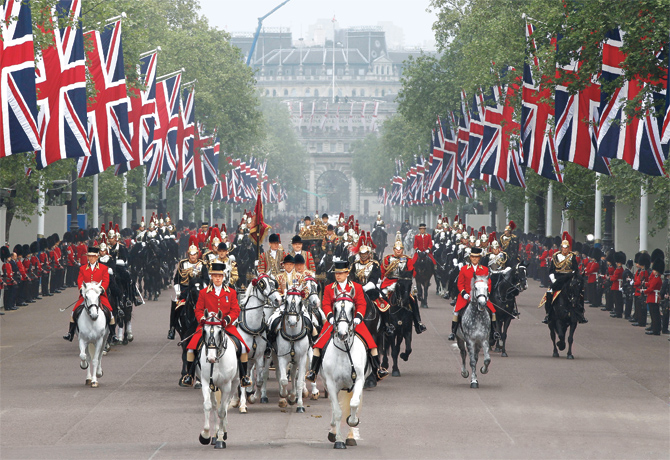
A million people gathered for a glimpse of the 2011 wedding procession of Prince William and Catherine Middleton
(2 of 3)
So republicans see in the beacons lit to celebrate the Queen's Jubilee the flames that may one day consume the monarchy. That ignores the institution's resilience. To understand why it has endured, one must understand what it has endured, and how it has anchored itself at the heart of British life. Because the people who plan to congregate on that Jubilee weekend — those who will wave flags and strain for a glimpse of the Queen's famous wave — agree on one issue with the people planning to protest the festivities: Like it or not, the monarchy still matters.
If 60 years doesn't seem like much in the sweep of human history, it's worth listening to a BBC radio report filed from Kenya on the day Princess Elizabeth became Queen. She was traveling there with her husband, the Duke of Edinburgh (she didn't make Philip a prince until 1957). The journalist Frank Gillard, who covered the royal visit, spoke with the distinctive upper-crust accent, A's shortened into E's, that has come to be called the Queen's English. Gillard recounted that he had seen Elizabeth shortly after 9 o'clock in the morning. "Then, looking a little tired but very heppy, she was driving away from the Treetops hut where she and the duke had spent the previous 19 hours, about as far removed from normal civilization as possible, even in Efrica." Her heppiness would last until news of her father's sudden death could be communicated by telegram and trunk calls and she learned of her loss — and her gain in status. "In the words of a member of the household," intoned Gillard, "she bore it like a Queen."
Six decades later, the Queen's subjects not only talk in different accents, the terms of their conversations have changed. Technology has been a key driver of that change, speeding communications and, in a foreshadowing of today's protest movements, breaking the stranglehold of big institutions like the BBC or Buckingham Palace on those communications and redrawing their terms of engagement. Journalists have long ceased to defer to the establishment. Before the end of the 20th century, a pack of paparazzi pursued Diana, Princess of Wales, into the Pont de l'Alma tunnel in Paris with tragic consequences. The disclosure in 2006 that the royal editor of the British Sunday tabloid News of the World, together with a private investigator on the newspaper's payroll, had hacked into the voicemail of Princes William and Harry made clear that the Windsors were considered fair game by the media, to be treated no better than garden-variety celebrities. The public evidently agreed. The hacking scandal would eventually bring down the 186-year-old tabloid (another seemingly impregnable institution to bite the dust in 2011), but only after it emerged that ordinary people, including victims of crime, had been targeted. Nobody seemed to worry too much about the rights of the Windsors to a private life.
That wasn't just because Britain and the wider world had become less deferential, though they had. The monarchy could no longer assume that anyone would bend the knee. When Princess Elizabeth was born, the British Empire extended across a quarter of the planet. By the time she ascended the throne, former colonies were asserting their independence. Then came the social revolutions of the 1960s, enshrining teenage rebellion against authority not as a passing phase but as a way of life and vaunting peace and love over the more traditional virtues embodied by the royals, like responsibility and duty. By the time of the Queen's Silver Jubilee, in 1977, the idealism of the previous decade had curdled into something more confrontational. "God save the Queen/She ain't no human being," intoned the Sex Pistols. Remote as Britain's head of state was, those words resonated.
They did so because another societal shift had altered expectations: the erosion of the private sphere. Everyone, even uptight Brits, had been learning by degrees to let it all hang out. Therapy culture fused with celebrity culture. People now expected to know everything about everyone. The Queen made concessions; she developed the walkabout, braving direct contact with crowds and reportedly joking, "To see me is to believe me." She broadened the old guest lists for palace entertainment from the posh and privileged to a more diversified representation of British life. She sometimes allowed TV cameras through her doors. But she remained, by instinct, a private person.
Those instincts were largely sound. The Queen is at least as famous as any celebrity on the planet, but she is beyond mere familiarity. She has preserved the sense of difference necessary to retain the support and respect of four-fifths of Britons and majorities in the 15 other countries where she serves as head of state and to hold together the Commonwealth of Nations.